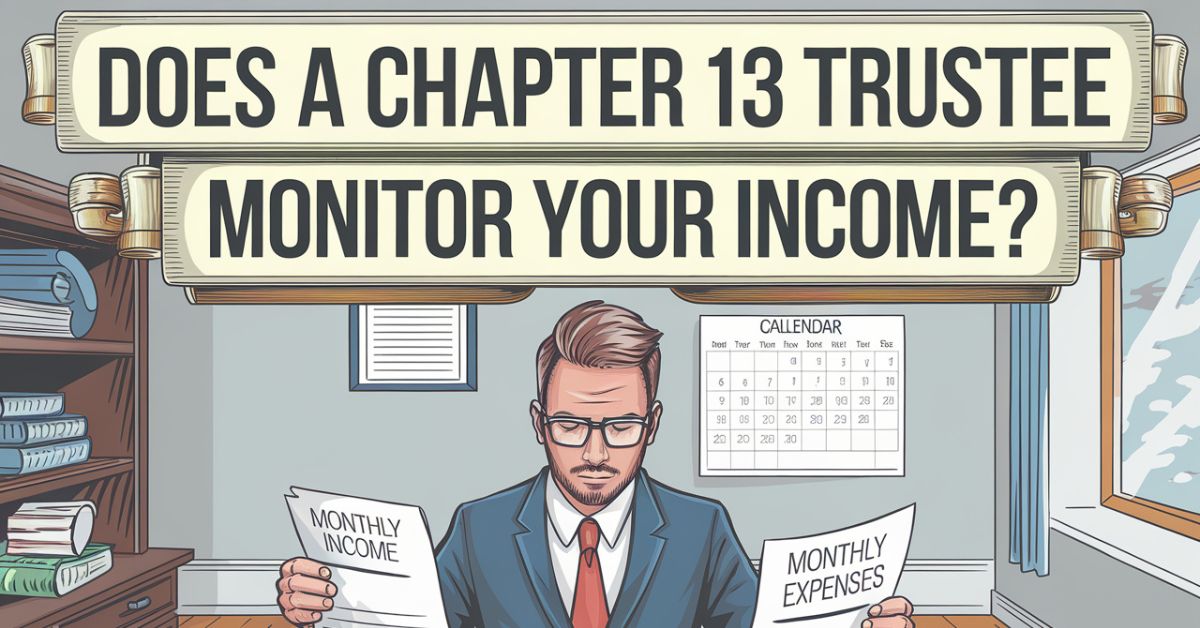Filing for Chapter 13 bankruptcy involves many questions, especially concerning income monitoring. A Chapter 13 trustee plays a crucial role in ensuring compliance with the repayment plan. Understanding how trustees monitor income is key to managing your bankruptcy successfully.
This article explores the various ways a Chapter 13 trustee oversees your income during bankruptcy. We will address common concerns, clarify the process, and provide actionable advice. By the end, you’ll have a comprehensive understanding of how this system works.
Whether you’re already in a Chapter 13 plan or considering one, knowing the trustee’s responsibilities can help you navigate this complex journey.
What is a Chapter 13 trustee’s role in income monitoring?
A Chapter 13 trustee ensures that you adhere to your repayment plan by reviewing your income and expenses. They verify the information provided in your bankruptcy filing and monitor any changes. The trustee also ensures that creditors receive payments as outlined in the plan, safeguarding the process’s integrity.
Read: Experience Seamless Connectivity straight talk login Essentials
How does the trustee verify your initial income details?
When filing for Chapter 13, you must submit pay stubs, tax returns, and other proof of income. The trustee uses these documents to evaluate your repayment capacity. This initial verification forms the basis of your repayment plan and helps determine the amount you’ll pay monthly.
Does the trustee track changes in income during the repayment period?
Yes, the trustee tracks changes in income to ensure your repayment plan remains accurate. You are required to report any significant income changes, such as a raise or job loss. This helps adjust your plan if necessary, keeping payments fair for both you and your creditors.
Read: Monitor Lanes – A Comprehensive Guide
What documents do I need to submit to the trustee regularly?
You may need to provide updated tax returns, pay stubs, or bank statements annually. Some trustees request these documents more frequently to ensure compliance with the plan. Keeping accurate and organized financial records is essential for this ongoing process.
How do trustees handle overtime, bonuses, or irregular income?
Trustees include overtime and bonuses in their income evaluations if these earnings are consistent. If they are irregular, the trustee may adjust your plan based on their occurrence. Transparency about these earnings prevents issues during the monitoring process.
What happens if I fail to report income changes?
Failing to report income changes can lead to significant consequences, including plan dismissal. The trustee may view this as noncompliance, which could jeopardize your bankruptcy protections. Always inform the trustee promptly about changes to avoid complications.
Does the trustee have access to my tax returns?
Yes, the trustee requires you to submit tax returns annually to verify income consistency. Any discrepancies between your tax returns and reported income could prompt further investigation. Tax documents are a crucial tool for trustees in monitoring your compliance.
Can the trustee request bank statements?
Trustees can request bank statements to confirm income deposits and track expenses. This allows them to identify any unreported income or discrepancies. Providing these records ensures transparency and avoids delays in your repayment process.
How does the trustee address changes in household size?
Changes in household size, such as adding a dependent, can affect your repayment plan. The trustee may adjust your expenses and income calculations accordingly. Reporting these changes helps maintain a fair and feasible repayment schedule.
What role do creditors play in income monitoring?
Creditors do not directly monitor your income, but they rely on the trustee to ensure accurate reporting. If discrepancies arise, creditors can file motions to investigate further. Trustees act as intermediaries to maintain accountability and transparency in the process.
Does the trustee monitor self-employment income?
Yes, self-employed individuals must provide detailed records, including profit and loss statements. Trustees review these documents to verify consistent income reporting. Accurate bookkeeping is essential for self-employed individuals in Chapter 13.
What are the penalties for unreported income?
Unreported income can result in plan dismissal, loss of bankruptcy protections, or legal penalties. Trustees take income monitoring seriously to maintain the integrity of the process. Always report changes promptly to avoid these issues.
Can I dispute the trustee’s income assessments?
Yes, if you disagree with the trustee’s evaluation, you can present evidence to support your claim. Working with a bankruptcy attorney can help resolve disputes and ensure fair treatment. Clear communication is vital in addressing these issues effectively.
Conclusion
Navigating Chapter 13 bankruptcy requires transparency and compliance with your repayment plan. The trustee plays a vital role in monitoring your income to ensure fairness and accountability. By understanding their responsibilities, you can better manage your financial obligations.
Keeping the trustee informed about changes in income or expenses is crucial for a successful bankruptcy process. Accurate reporting and prompt communication can help you avoid penalties or plan dismissals. These steps ensure a smoother path toward financial recovery.
By following the guidelines outlined in this article, you’ll be better equipped to handle the complexities of Chapter 13. Whether you’re self-employed or salaried, understanding how the trustee monitors your income can alleviate stress and pave the way for a successful financial future.
FAQs
1. What happens if I get a raise during Chapter 13?
You must report raises to the trustee to adjust your plan if necessary.
2. Can I keep extra income during Chapter 13?
Extra income may need to be included in your repayment plan.
3. Does the trustee monitor my spouse’s income?
Yes, if your spouse contributes to household income, it is included.
4. What if I inherit money during Chapter 13?
Inheritances must be reported and may affect your plan.
5. Do I need to inform the trustee about a new job?
Yes, new employment must be reported to update your plan.
6. Can the trustee access my financial accounts?
Trustees can request bank statements and other records.
7. What if I lose my job during Chapter 13?
Inform the trustee immediately to modify your repayment plan.
8. Are retirement account withdrawals monitored?
Yes, withdrawals may need to be reported to the trustee.
9. Can I switch to Chapter 7 if my income changes?
In some cases, income changes may allow a switch to Chapter 7.
10. Is self-employment income treated differently?
No, but detailed records are required for verification.










